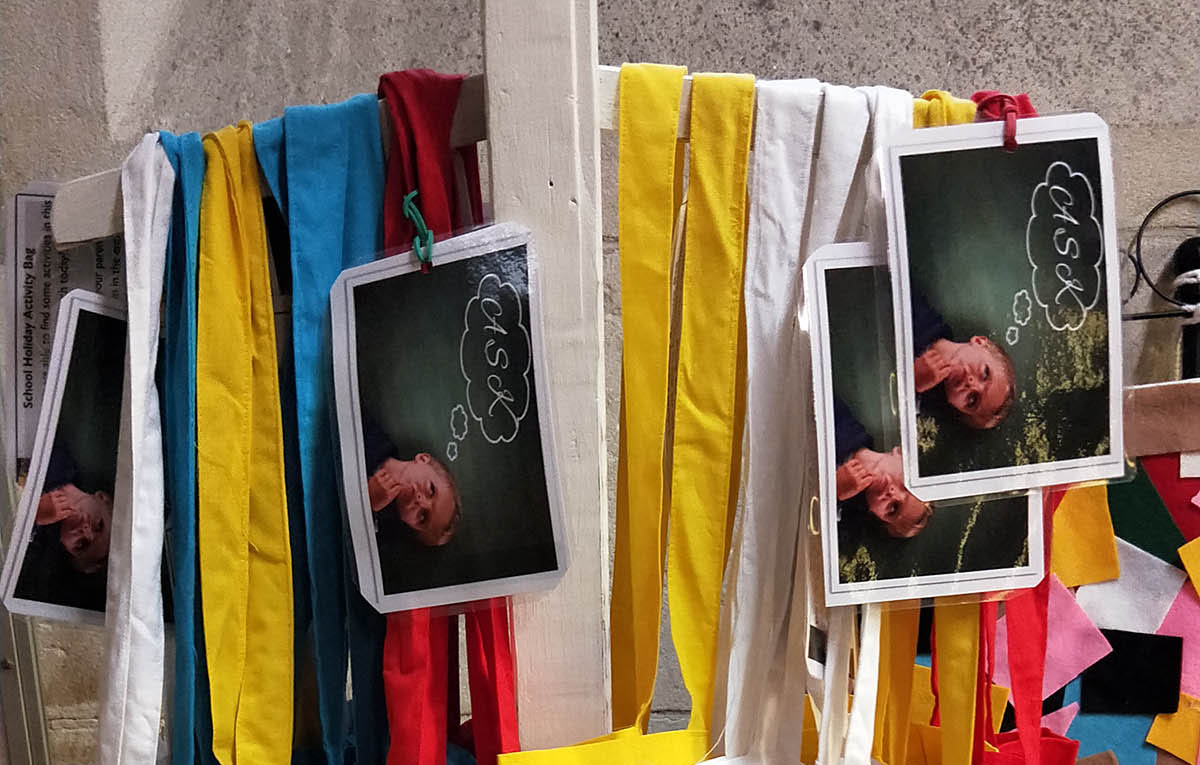ASK (All Saints’ Kids)
Children are always welcome, and encouraged to take part in the life of our Parish.
ASK (All Saints’ Kids) takes place as part of our 10am worship during school term time.
ASK is a programme led by our Children’s Minister and members of our Parish for children aged 4 to 12.
ASK commences shortly after the Greeting of Peace in our service.
The children are blessed and then depart for activities that may include games, craft, singing or drama – while the rest of the congregation participates in readings, the sermon and prayers.
The children return during the Offertory Hymn in order to participate within Holy Communion with their families.

SRE (Special Religious Education) & Chaplaincy
As a church we desire to see every generation learning about the love of Jesus and are committed to teaching the Christian faith in our local schools through Special Religious Education. At Hunters Hill Primary School we have a trained and dedicated team of volunteers who teach the Christian faith each week.
We also work through RHEMA (Riverside and Hunters Hill Education Ministry Association) to ensure that SRE is offered at Riverside Girls School and Hunters Hill High School.
We work with our ecumenical partners to also provide a Chaplain to Hunters Hill High School through Generate Ministries.
Faith @ Home
Family Faith Formation
Faith is caught more than taught – it is more dependent on relationships – both with family members, with church members and most importantly with God.
The family home is the most significant place in which faith is nurtured and lived out. Family Faith Formation is about linking congregation and family together.
Formation is very different to “indoctrination”. Formation is about providing an environment where faith may be explored, tested, taught, and seen in action
Christian formation includes:
- Belonging – being embraced by God and the community of faith as beloved and accepted;
- Thanksgiving – living with a sense of gratitude for the gift of life that surrounds us;
- Giftedness – knowing each person is wondrously and uniquely made, with gifts and abilities to contribute to the community;
- Hospitality – sharing one’s gifts and welcoming the gifts of others;
- Understanding and forgiveness – being aware of myself, and of others; knowing what it is to be healed, and to be a healer; being able to truly forgive and seek forgiveness;
- Love – knowing that God is loving, embracing and desiring a relationship with me;
- Peace – finding wholeness and centeredness in the midst of chaos;
- Joy – learning to find real joy in life – not just happiness, but joy;
- Hope – expecting that there is something more
Four Keys to Nurturing Faith
Research has shown that children who have faith within their lives are able to deal more explicitly with life – it seems that they have characteristics that make them more “resilient” and capable to deal with what life throws at them. Households, churches and schools that practice four very simple key areas of spiritual development produce children who are soundly formed, not only in faith, but also in life skills.
Caring conversations indicate an interest in others – their hurts, their joys, their concerns and dreams, their values and faith. Such conversations require that time be available for listening and speaking. Our Churches have the capacity to be in partnership with families and help them identify the ‘holy ground’ of their lives where precious, caring conversations take place. It is here that lives are strengthened and nurtured by the love and mercy of God through the support, guidance and genuine interest of others.
Religion is a way to practice the presence of God. Many families and individuals need help with the language of prayer and faith in daily life. A spiritual life is more of a consciousness and way of life than a formula to accomplish a certain task. Devotions can connect the generations with faith, hope and love in the world. Our Churches can promote a variety of possibilities for an individual or family devotional life. A spiritual life can be experienced through silent meditation while going for a walk. It can take place at meal time, naptime, exercise time etc. It can be expressed through readings, songs, liturgies, prayers, silent reflection, and mental images. The point is that it works best as a practice.
Rituals and traditions are those patterns of behaviour that can be expected to occur on a routine basis and communicate certain meaning in life. The way people greet one another each day, the use of table graces, bedtime prayers, the blessing of a Christmas tree, a birthday or baptismal anniversary celebration are all examples of family rituals and traditions that can effectively communicate faithful living.
Serving one’s neighbour is the calling all are given through the life and message of Jesus Christ. For a Christian, service is motivated out of the love we first received from God. Service communicates that love to others and is a concrete expression of one’s own faith and values. Family service projects have been shown to be a vital way to pass on faith from generation to generation. Children and young people are greatly influenced by what they see in the lives of others, especially parents and other family members. In our Parish we engage in a variety of acts of service – locally and across the world.